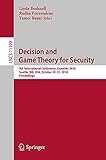Decision and Game Theory for Security [electronic resource] : 9th International Conference, GameSec 2018, Seattle, WA, USA, October 29–31, 2018, Proceedings /
Material type: TextSeries: Security and Cryptology ; 11199Publisher: Cham : Springer International Publishing : Imprint: Springer, 2018Edition: 1st ed. 2018Description: XIII, 638 p. 174 illus. online resourceContent type:
TextSeries: Security and Cryptology ; 11199Publisher: Cham : Springer International Publishing : Imprint: Springer, 2018Edition: 1st ed. 2018Description: XIII, 638 p. 174 illus. online resourceContent type: - text
- computer
- online resource
- 9783030015541
- 005.8 23
- QA76.9.A25
Use of game theory -- Control theory and mechanism design for security and privacy -- Decision making for cybersecurity and security requirements engineering -- Security and privacy for the Internet-of-Things -- Cyber-physical systems -- cloud computing -- Resilient control systems, and critical infrastructure -- Pricing -- Economic incentives -- Security investments, and cyber insurance for dependable and secure systems -- Risk assessment and security risk management -- Security and privacy of wireless and mobile communications, including user location privacy -- Sociotechnological and behavioral approaches to security -- Deceptive technologies in cybersecurity and privacy -- Empirical and experimental studies with game, control, or optimization theory-based analysis for security and privacy -- Adversarial machine learning and crowdsourcing, and the role of artificial intelligence in system security.
The 28 revised full papers presented together with 8 short papers were carefully reviewed and selected from 44 submissions. Among the topical areas covered were: use of game theory; control theory; and mechanism design for security and privacy; decision making for cybersecurity and security requirements engineering; security and privacy for the Internet-of-Things; cyber-physical systems; cloud computing; resilient control systems, and critical infrastructure; pricing; economic incentives; security investments, and cyber insurance for dependable and secure systems; risk assessment and security risk management; security and privacy of wireless and mobile communications, including user location privacy; sociotechnological and behavioral approaches to security; deceptive technologies in cybersecurity and privacy; empirical and experimental studies with game, control, or optimization theory-based analysis for security and privacy; and adversarial machine learning and crowdsourcing, and the role of artificial intelligence in system security.


There are no comments on this title.